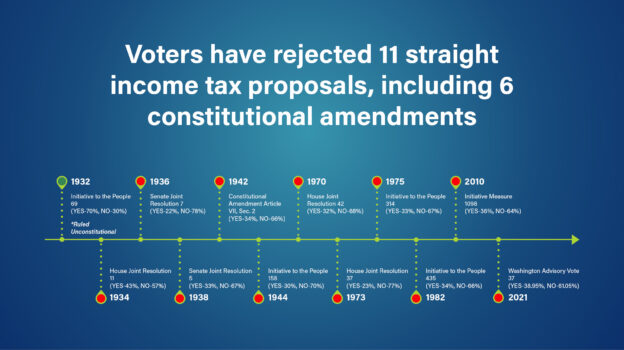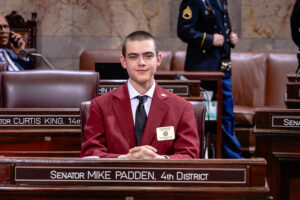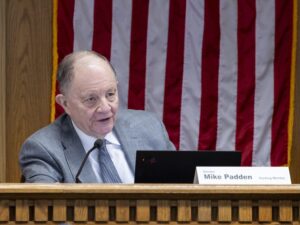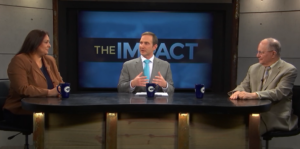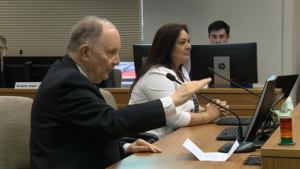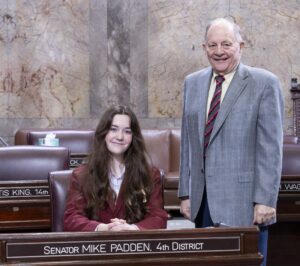Note: The following e-newsletter was sent to Sen. Padden’s subscribers February 1, 2024. To subscribe to Sen. Padden’s newsletter, click here.
Dear friends and neighbors,
It is looking more and more likely that the six initiatives now before the Legislature will wind up going before Washington voters this November.
In late December, petitions containing more than the required number of valid voter signatures for the six measures were delivered to the Office of Secretary of State’s Elections Division, which then conducted a standard signature-check process.
Sponsors said each of the six initiatives had at least 424,896 signatures, well over the minimum of 324,516 signatures needed to be certified, and more than the recommended total of 405,000. According to the initiatives’ sponsors, the combined total number of signatures for the six measures was 2,684,663.
As Secretary of State Steve Hobbs certified each of the six initiatives, it was delivered to the Legislature for consideration.
This graphic shows that Washington voters have rejected 11 income-tax proposals. It is appearing more likely that they will have their say again this fall on a measure that would ban any local or state government in Washington from imposing an income tax.
By the end of this past week, all six initiatives had been certified and sent to the Legislature:
- Initiative 2113 deals with police pursuits. It would erase certain requirements that since 2021 have prevented law-enforcement officers from pursuing a suspect unless they think someone has committed certain crimes, including a violent offense or driving while impaired. It has been sent to the Senate Law and Justice Committee for consideration.
- I-2117 would repeal the state’s costly climate policy, called “cap-and-trade” by some but “cap-and-tax” or “cap-and-gouge,” by opponents who note this law has caused gas prices to rise substantially. The climate policy became state law in 2021 and took full effect early last year. It is now in the Senate Environment, Energy and Technology Committee.
- I-2081 would give parents the right to review K-12 instructional materials and require parental notification of school-provided medical services. It has been referred to the Senate Early Learning and K-12 Education Committee.
- I-2109 would repeal the state capital-gains tax that was passed by the Democrat-controlled Legislature in 2021. It is now in the Senate Ways and Means Committee.
- I-2111 would ban any local or state government in our state from imposing an income tax. Like I-2109, this measure is in the Ways and Means Committee.
- I-2124 would allow people to opt out of the mandatory payroll tax for the state-run long-term care program. It is before the Senate Labor and Commerce Committee.
Legislators have three options with initiatives to the Legislature: 1) adopt the initiative as written, in which case it becomes law; 2) refuse to pass it, which would result in the measure automatically being placed on the statewide ballot next fall; 3) propose and approve an alternative initiative, in which case both the original initiative and the alternative would both appear together on the fall statewide ballot.
Regretably, Senate Democrats so far have refused to even schedule public hearings on any of the six initiatives. Any initiative not enacted this session will be placed on the statewide ballot this fall for you and other voters to decide.
If you have questions about how to participate in state government this year or thoughts to share on anything in this e-newsletter, please give me a call or send me an email.
Thank you, as always, for the honor of representing you in Olympia!
Best Regards,
Senator Mike Padden
Panel passes pollinator proposal
A bill I introduced at the request of a Mount Spokane High School student to help bees and other pollinators is buzzing through the Senate this year.
The Senate Local Government, Land Use and Tribal Affairs Committee on Tuesday approved Senate Bill 5934, a bipartisan measure that aims to promote the use of pollinator-friendly shrubs or bushes in landscaping.
Mount Spokane High School senior Julia Costello approached me this past fall about sponsoring the bill.
Julia is a Girl Scout working to complete the requirements to earn the Gold Award, which is equivalent to earning the Eagle Scout award as a Boy Scout. One of Julia’s Gold Award requirements is working with a legislator on sponsoring a bill. Julia made a compelling case why improving pollinators’ habitat is beneficial. It was nice for Julia to see this bill pass out of committee. It has been an honor and pleasure to work with her.
Before passing SB 5934, the Senate panel approved an amendment that establishes that a local government may encourage, but does not have to require, applicants for project or commercial-building permits to include pollinator-friendly plants in any landscaped area.
Spokane Conservation District Director Vicki Carter sent a letter in support of SB 5934.
The proposal will be sent to the Senate Rules Committee, which serves as the final hurdle before bills reach the Senate floor for a vote by the entire Senate.
Gonzaga Prep student serves as page
Last week I had the pleasure of sponsoring Anthony DeGon (in photo above), a sophomore at Gonzaga Preparatory School in Spokane, during his week as a Senate page at the Capitol.
Anthony told me he is very interested in representative government, so I think he really enjoyed his time here in Olympia and seeing how the Legislature works.
He enjoys playing football, soccer, skating and reading in his free time. He also is an active member of the Prep debate team. He wants to attend college to further his future by studying political psychology. Anthony is the son of Alice DeGon.
The Senate Page Program is an opportunity for Washington students to spend a week working in the Legislature. Students are responsible for transporting documents between offices, as well as delivering messages and mail. Pages spend time in the Senate chamber and attend page school to learn about parliamentary procedure and the legislative process. Students also draft their own bills and engage in a mock committee.
Committee OKs Padden health-care bill
Last Thursday, the Senate Health and Long Term Care Committee passed Senate Bill 5920, my proposal that would allow our state Department of Health to have more psychiatric beds in our state.
This proposal would reinstate authority for the Department of Health until 2028 to grant certificate-of-need exemptions related to increasing psychiatric-bed capacity by allowing additional psychiatric beds or construction of a new psychiatric hospital.
A couple of years ago, a company was deterred from building a psychiatric hospital in Spokane Valley due to the certificate-of-need process. It was built in California instead, which does not require a certificate of need. The federal government figured out long ago that certificates of need do not work; it repealed federal certificate-of-need requirements in 1987.
SB 5920 addresses a need for vulnerable people and illustrates how certificates of need hurt Washingtonians. The need for more beds is clear, and the certificate-of-need law is an unnecessary barrier. States with these laws have higher costs and fewer medical services.
Two weeks ago, Elizabeth Hovde, who testified in favor of SB 5920 during its public hearing before the Health and Long Term Care Committee, wrote about the bill for the Washington Policy Center. You may read her article here.
TVW interview on “ditch the switch” bill
Senator Manka Dhingra (left) and I were interviewed last week by The Impact host Mike McClanahan about SB 5795, our legislation to “ditch the switch” by keeping Washington on year-round standard time.
Last Wednesday, I had the privilege of doing a sit-down interview at the TVW headquarters in Olympia for the weekly show “The Impact”. Host Mike McClanahan had invited Redmond Senator Manka Dhingra and me to discuss Senate Bill 5795, the proposal that we are sponsoring this year to “ditch the switch” by keeping Washington on year-round standard time instead of going back and forth between standard time and daylight saving time each year. You may watch our interview here.
“The Impact” airs on TVW on Wednesdays at 7 p.m. and 10 p.m.
Unfortunately, the chair of the Senate State Government and Elections Committee, Senator Sam Hunt of Olympia, after originally scheduling SB 5795 for a vote, chose not to bring up SB 5795 for a vote before the committee cutoff yesterday. Unless something significant happens between now and the end of session, it appears that the “ditch the switch” bill will need to wait till next year, which means that Washingtonians will be forced to continue switching between standard time and daylight saving time each year.
State senators send letter to Congress in support of Snake River dams
Lower Granite Dam on the Snake River.
One federal issue that has the attention of many Washington state legislators is the fate of the four lower Snake River dams between Clarkston and the Tri-Cities. Last December’s announcement by the Biden administration that it and four Northwest tribes were “partnering to restore wild salmon habitats in the Columbia River Basin” while exploring the possibility of breaching the four dams in the future has been a major concern for state lawmakers, especially those from eastern Washington.
That is why I spearheaded a letter last week in support of the four Snake River dams, signed by 20 state Senate Republicans members. The letter was sent to 5th District U.S. Representative Cathy McMorris Rodgers, who chairs the House Energy and Commerce Committee, as well as the committee’s ranking member and chair and ranking member of the House Energy, Climate, and Grid Security Subcommittee.
Earlier this week, I met with two officials with Modern Electric Water Company – an electric and water utility in Spokane Valley – who visited Olympia, General Manager Joe Morgan and Government Relations and Communications Coordinator Chelsea Martin. Chelsea last week sent a letter of support for the dams on behalf of Modern Electric Water Company to Representative McMorris Rodgers and the other three U.S. House members.
Senator Padden this week talked about energy issues and the four lower Snake River dams with two officials from Spokane Valley’s Modern Electric Water Company, General Manager Joe Morgan (left) and Government Relations and Communications Coordinator Chelsea Martin (middle).
Contact us!
If you have a question or concern about state government, please do not hesitate to contact our office. During the session we are conducting business from our Senate office in Olympia. We are here to serve you!
Phone: (360) 786-7606
Olympia Office: 215 Legislative Modular Building, Olympia, WA 98504-0404
Email address: Mike.Padden@leg.wa.gov
PLEASE NOTE: Any email or documents you provide to this office may be subject to disclosure under RCW 42.56. If you would prefer to communicate by phone, please contact Sen. Padden’s Olympia office at (360) 786-7606.
To request public records from Sen. Padden, please contact Randi Stratton, the designated public records officer for the Secretary of the Senate and Senate members.











